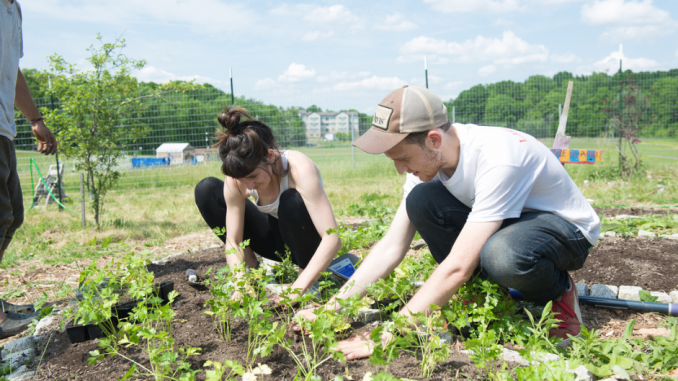
What started out as a mere pile of rubble has now sprouted into a blooming, experimental space for students to grow their own vegetables, fruits and herbs.
Members of Students for Sustainable Agriculture (Sus-Ag) have spent the summer cultivating their very own crops in the micro-farm on campus, located atop the hill behind the soccer fields near Esopus Hall. Fourth-year environmental studies contract major and Sus-Ag President Billie Golan described the micro-farm as “more than a garden but less than a farm,” with summer produce including rainbow chard, kale, bokchoy, tomatoes, peppers, eggplant, watermelon, mint, parsley, basil, calendula, morning glories, marigolds and more.
With a group of 20 students living in New Paltz throughout the summer, Sus-Ag found a way to better upkeep the micro-farm unlike they had in the past.
“We’ve had a tumultuous past with the garden,” Golan said. “There used to be a small one next to a dorm building that wasn’t receiving upkeep, and because the college was focusing on aesthetics, they ripped it up and gave us the rubble pile to deal with.”
But the student members of Sus-Ag proved they could grow their plethora of fresh crops from just about nothing. Members built their own fence in order to keep stray animals such as deer from eating the food. After the fence was built, the club received access to the greenhouse on campus, where they began to germinate their own seedlings.
Golan said that since the fruition of the micro-farm at the beginning of the summer, Sus-Ag has grown at least 100 pounds of vegetables, with all seeds being donated from farms that club members have volunteered at past and present, such as Acorn Hill Farm, Huguenot Street Farm and Phillie’s Bridge Farm Project. Now, Golan said, the main issue is figuring out what to do with their abundance of fresh food.
“Everything we’ve produced we’ve been eating ourselves,” Golan said. “A lot of us haven’t had to buy vegetables in a long time. But even though it’s a small space we produce more than we can eat, so what we are trying to do is give it away to students, faculty and food pantries that need them.”
Brenna Rathbone, member of Sus-Ag and third-year international relations major with a minor in environmental studies, worked on the micro-farm at least three days a week during the summer. By working on the micro-farm and acquiring farm experience, she said that she’s gained a greater appreciation for the work farmers do.
“I never realized how much work farming was and how much of a science it is,” she said. “I have such a greater appreciation for where food comes from and I, myself, have become much less wasteful of food.”
Rathbone said that after learning how to grow her own crops, she has no doubt that others within the community can learn to sustain themselves as well.
“There is a lot of learning that the campus and community can do,” she said. “Yes, there is a lot that goes into the farming, but if it becomes a part of your everyday life, it would be just like going to the grocery store. It’s just about changing what you focus your energy on.”
In the future, Sus-Ag hopes to be able to create a more central location for the micro-farm on campus, allowing it to be more known and accessible to students, faculty and community members. Golan also said a main goal would be to get more students and faculty involved with the micro-farm as well as further educating them about nutrition and sustainability.
“You never regret learning how to grow your own food,” she said. “The more people know how to grow their own food, the better off they’ll be. And the micro-farm is right here on campus, so you can walk there and you can come back with cucumbers or a piece of watermelon, and that’s really special.”
